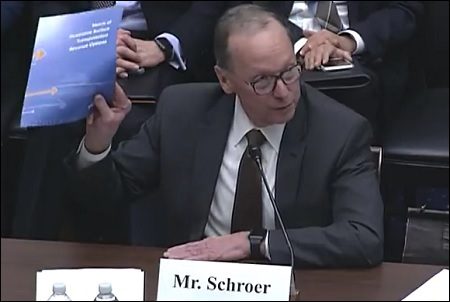Led by Tennessee Department of Transportation Commissioner John Schroer and Colorado DOT Executive Director Michael Lewis, a group of industry stakeholders strongly called for Congress and President Trump to come up with enough long-term highway and transit revenue to avert a funding crisis in 2020.
The officials made their comments at a March 7 hearing on “Building a 21st Century Infrastructure for America: Long-Term Funding for Highways and Transit Programs,” held by the House Transportation and Infrastructure Subcommittee on Highways and Transit.
Schroer, who was also speaking as current-year president of the American Association of State Highway and Transportation Officials, was the first of the panel to testify. He said that when a five-year authorization of surface transportation programs expires in 2020, the Highway Trust Fund faces a “cliff” in which available project funds will sharply fall.
“In terms of federal highway obligations,” Schroer warned, “AASHTO estimates that states may see a 40 percent drop from FY 2020 to the following year – from $46.2 billion to $27.7 billion in FY 2021.”
He added that “in the past, such similar shortfall situations have led to the possibility of a reduction in federal reimbursements to states on existing obligations, leading to serious cash flow problems for states and resulting in project delays.”
And “more alarmingly, due to a steeper projected shortfall in the [trust fund’s] mass transit account, new federal transit obligations are expected to be zeroed out between FY 2021 and FY 2023, excluding any ‘flex’ of highway dollars to transit.”
So unless Congress acts soon to head off that situation, Schroer said that “simply put, this is a devastating scenario that we must do all we can to avoid.”
He also noted that AASHTO has drawn up a list of revenue options Congress could pursue to fix the trust fund.
And Schroer pointed out that many states including Tennessee have in recent years increased their own road and transit funding while waiting for their federal partner to take such action.
“I mention this,” he said, “because AASHTO and its members vehemently disagree with any notion that federal transportation funding displaces or discourages state and local investment. In fact, as evidenced by significant transportation infrastructure investment needs, further strengthening and reaffirmation of the federally assisted, state-implemented foundation of the national program is even more critical now than in the past.”
The Colorado DOT’s Lewis reported on states’ efforts to test mileage-based revenue alternatives, but told lawmakers they need to bolster trust fund receipts now through other means because such road user charges would not be ready to implement nationwide for perhaps 10 more years. (See related story.)
Chris Spear, CEO of the American Trucking Associations, and Ed Mortimer, executive director for transportation and infrastructure at the U.S. Chamber of Commerce, told lawmakers they are ready to help mobilize support behind congressional efforts to increase transportation revenue.
Both of their groups have proposed increasing federal motor fuel user fees as the most efficient way to raise substantial amounts of new project revenue.
Spear said the committee and stakeholders are all holding such a discussion now because of President Trump’s push for a new infrastructure investment plan, but said the president would also need to strongly advocate for a new revenue proposal in order to get lawmakers to approve it.
And Thea Lee, president of the Economic Policy Institute, said that “allowing the Highway Trust Fund to become progressively underfunded in the coming decade would do great damage . . . To ensure that HTF has resources to fund planned expenditures, the current gas tax should be raised or a new dedicated revenue source for the HTF should be found.”
Lawmakers from both parties said they would support measures to increase project funding, but underscored the political difficulty of the task.
The same day, Democratic senators announced they would propose rolling back some just-passed tax breaks for wealthy people and corporations to pay for a $1 trillion, 10-year infrastructure package.


